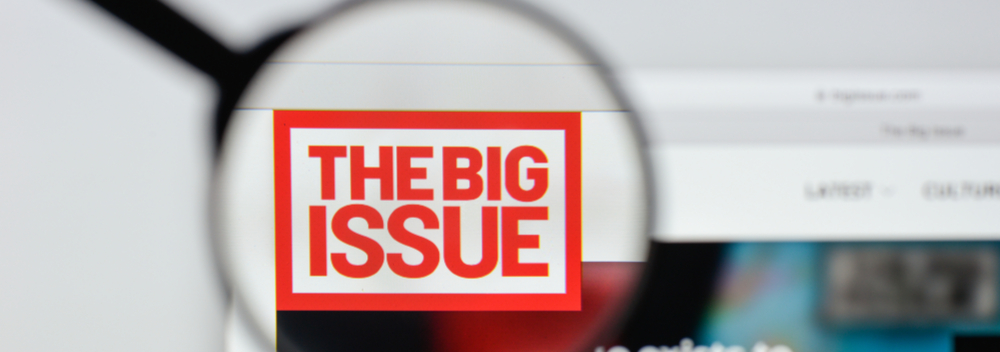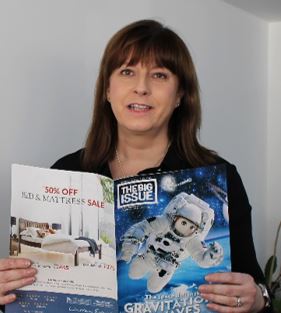My working day: Elizabeth Divver, Group HR Director, The Big Issue
- 7 Min Read
In a regular new series, HRD Connect speaks with leaders from all different industries about their working day. In our latest feature, we spoke with Elizabeth Divver, Group HR Director, The Big Issue.
- Author: Emily Sexton-Brown
- Date published: Sep 18, 2018
- Categories


Learning from your peers is very important when it comes to overcoming challenges and adapting to new working environments. In a new series launched by HRD Connect we find out how your peers shape and craft their working days.
What time does your day start?
On a gym day, my day starts at 6 am – if I planned to go after work, I’d never get there. The way I make sure I fit enough gym sessions into a week is to pack my bag the night before so all I have to do when my alarm goes off is get up and get going without thinking about it.
What is the first thing you do when you wake up?
Check the travel news and weather.
What for you kick starts your day correctly?
One of the reasons I don’t hit the snooze button on gym mornings is that I know I’ll feel so much better afterwards than I did before.
What is your commute like to work?
For a Londoner, I am lucky. Most of my commute is above ground in an air-conditioned train and I only have to descend into the hell that is the Underground for one stop.
What is the first thing you do when you get to the office/start working?
I check my inbox while I am on the train. I like to know what I am walking into!
Can you talk me through a typical morning for you…?
I don’t have a typical day. It’s one of the great pleasures of HR that there is so much variety.
“When you have real stars in your team, all you need to do is agree the goals with them, get the obstacles out of their way and let them go for it.”
 What do you have for lunch?
What do you have for lunch?
My office is in an area with a significant Turkish presence, so it’s easy to find delicious skewers of chicken cooked on charcoal with heaps of fresh, crunchy salad. Other favourites are gozemle (very thin, stuffed savoury pancakes cooked on a round, domed hotplate until they are crispy) and menemem, which is like huevos rancheros but with the eggs broken up into the spicy sauce with a fork while they cook. Yum!
Do you feel more productive in the morning, or after lunch? My favourite time for work that needs concentration is early evening. During the day I’m talking to people, reacting and interacting. When the office starts thinning out is my time to get things done. As I travel into work after the rush hour in the morning, I finish later too s that suits my body clock.
What do you think is the best way to motivate a team?
I have been fortunate in having had some fantastic people in my team over the years. When you have real stars in your team, all you need to do is agree the goals with them, get the obstacles out of their way and let them go for it. They need to know you are there, ready to be a sounding board or lend a hand if things get tricky, and they need to know you will go to bat for them with the rest of the organisation – everywhere I’ve ever worked has said that people shouldn’t be penalised for an honest mistake and that mistakes are part of learning, but living up to that in the real world seems to be easier said than done. My current organisation comes close to making that real, but people still need to know that if they try something new and it doesn’t come off, you have got their backs.
What is the one thing you never forget to do throughout your day?
Put the kettle. Tea is my fuel.
What time do you leave work?
It depends. 7-ish feels about right. I try not to stay past 8. If it’s the last day before a holiday, it can be 9 and later but I’ll treat myself to a cab home.
Do you think you have a good work/life balance?
I find ‘work/life balance’ an odd expression. It implies that work is separate from life. I am very lucky as I have absorbing, worthwhile work which is part of my life. I recently came across the concepts of integrators and separators in the context of work/life balance. If you’re an integrator, your stress level would go up if your access to email was blocked outside office hours but if you’re a separator, you need a clear division. I must be an integrator.
What do you do in the evenings?
My husband is the chef in our house, so if he’s home we’ll probably eat in. If I’m by myself, there are two great little places on my way home from the station. One is Vietnamese, which is such a light, healthy cuisine, and the other offers Pakistani home cooking, which is a bit more substantial but still so much healthier than the traditional ghee-soaked take-away. It’s funny how often my feet carry me into one or other! Both places know me and I can sit with a book, some delicious food and unwind.
“If you’re an integrator, your stress level would go up if your access to email was blocked outside office hours but if you’re a separator, you need a clear division. I must be an integrator.”
When is bedtime?
I’m trying to train myself to get more sleep. At one time it seemed to be a badge of honour to manage on a few hours – remember Mrs Thatcher and her 4 hours a night? – but although I know I can function on 5 1/2 hours, I am trying to build up to 7 hours a night although I’m finding it a struggle.
A bit about you…
What is your personal career highlight?
There are a few things I will never forget. There was a very senior employee I became friends with after he left. He told me he had a recurring nightmare of being chased but in his dreams, he always knew he would be safe if he could get to my office. There was an employee who had a 6-month absence with depression and who told me I had been a material factor in his recovery. Then there was the regional manager I probably only speak to 3 or 4 times a year, who told one of my team that I’d had more of an impact on the organisation than any MD or CEO had done. Each one was quite unexpected and each one blew me away. I feel much prouder of their feedback than winning tribunals.
What do you do to unwind?
Reading, cinema, exercise and best of all: family. I also collect vintage and modern perfumes.
What is your favourite food?
So many cuisines, so little time!
What is the best piece of advice you’ve been given?
When something is good enough, stop. I thought I had beaten an unhelpful tendency to perfectionism, but when I did my MBA, one of my fellow students said, “you write the assignment, and then you spend 3 days getting it up another 5%”. In books on smart answers to difficult interview questions, one of the standard responses to being asked about your weaknesses is to dress up a strength as a weakness, and perfectionism is often given as an example. I don’t agree! Perfectionism is a real obstacle to achievement and I am very grateful to the people who have pointed out to me what an utter waste of time it is. Whatever you are doing when you’re at work, get it done, go on to the next thing. Getting projects over the finishing line is much more important than aiming at perfection.
What would you like to be remembered for?
Leaving the organisation stronger than I found it and for the people who got their start in my team and went on to have great careers.






